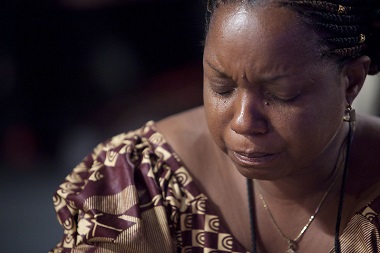
Rev. Chongo Phiri, founder of Heart of Mercy in Lusaka, Zambia, praying at Cape Town 2010. Lausanne Movement photo
Ten years ago to the day I was seated with well over 4,000 delegates from 198 nations at the Third Lausanne Congress for World Evangelization in Cape Town.
Christianity Today described Cape Town 2010 as the most representative gathering of Christian leaders in the 2,000 year history of the Christian movement. Possibly a degree of hyperbole there, but it was indeed a moving and momentous occasion, with a continuing impact.
Below is posted a summary of the key document proceeding from the gathering, The Cape Town Commitment.
But first a brief overview of what organizers felt were the main achievements of Cape Town 2010, and a taste of my experience there.
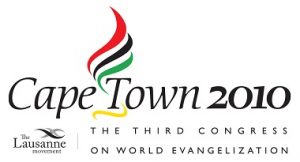 Main achievements
Main achievements
- Sounded a ringing affirmation of the truth of Jesus Christ;
- Presented a clear statement on Christian witness among people of other faiths;
- Provided a re-focused emphasis on evangelism and the integral mission of the Church;
- Issued a clarion call to eradicate Bible poverty;
- Called the Church back to humility, integrity and simplicity; and
- Offered an earnest challenge to new collaborative initiatives and partnerships addressing the important issues facing the church and God’s world.
My experience
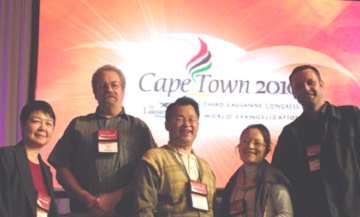
Our table group gathered at Cape Town 2010; I’m second from the left.
Here is a portion of a report I sent back to BC Christian News (of which I was publisher/editor) October 21, 2010:
When I landed in Cape Town the other day, I completed a round trip (of sorts) in my journey as a Christian believer. I am back on African soil for the first time since I was saved, while traveling through Zambia, in 1977.
I’ve had the opportunity to reflect on my own pilgrimage; but I’ve also developed a renewed appreciation of the simple words and acts, carried out by so many anonymous – and sometimes well recognized – people all over the world.
It is that proclamation of the gospel, accompanied by caring deeds, which led to the dramatic growth of the church in the global south (not least in Africa) over the past century. And that’s what the Lausanne Congress on World Evangelization is building on in Cape Town. . . .
Every day, I meet people who make it abundantly clear why the gospel continues to spread – why Christianity is both the largest and fastest growing faith on earth.
Let me take just a few examples from Africa. Ntsiuoa, a doctor from Lesotho, works in an AIDS clinic. Asheber, from Ethiopia, says thousands of Muslims are coming to Christ; he and his flock are busier discipling than evangelizing. Sarah, a Ugandan who runs an electricity transmission company, spends the rest of her time working with widows.

We were grouped at tables for conversation and collaboration. Lausanne Movement photo
Today we visited The Warehouse, which works with churches in rich and poor areas, including ‘informal settlements’ (formerly townships, some might say suburban slums). We toured the Warehouse itself, where the staff and volunteers pray an hour every day before they carry on with their more mundane work. They educate, they train, they provide food, they encourage justice rather than charity – but mainly they “seek to change the lives of the poor by restoring their dignity and building meaningful relationships with them.”
Not all stories at Lausanne suggest victory. At my table group of six people – we meet twice every day – we hear from Hikari that in Japan the number of Christians remains stalled at below one percent; from Paul that many young Koreans no longer buy the ‘soul winning’ approach to the gospel, and are dropping out of church; from Matt that New Zealanders are comfortable and apathetic about the gospel message.
But the key is that they – and multitudes more like them – carry on in their work, spreading the message of the gospel, person by person.
Go here if you would like to read the full article.
The Cape Town Commitment
From the Lausanne Movement site:
The Cape Town Commitment, issued out of Cape Town 2010, stands in the historic line of The Lausanne Covenant and Manila Manifesto. . . .
The CTC is rooted in the conviction that ‘we must respond in Christian mission to the realities of our own generation.’ The mission of the Church must take seriously both the unchanging nature of God’s word and the changing realities of our world.
The CTC reflects the Lausanne call for the whole Church to take the whole gospel to the whole world; it is framed in the language of love – love for the whole gospel, the whole Church, and the whole world. The Commitment has two parts: a confession of faith and a call to action.
Part I – For the Lord we love: The Cape Town Confession of Faith
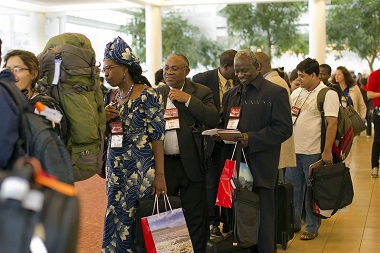
Participants arriving at Cape Town 2010. Lausanne Movement photo
The opening sentences set the framework, ‘The mission of God flows from the love of God. The mission of God’s people flows from our love for God and for all that God loves.’
The first five points deal with our love for God himself.
- We love the living God, above all rivals and with a passion for his glory.
- We love the triune God: Father, Son, and Holy Spirit.
- With respect to the Father, the CTC calls for a renewed appreciation of God’s fatherhood.
- Concerning the Son, it highlights our duty to trust, obey, and proclaim Christ.
- Of the Spirit, it says, ‘Our engagement in mission, then, is pointless and fruitless without the presence, guidance and power of the Holy Spirit. . . . There is no true or whole gospel, and no authentic biblical mission, without the Person, work and power of the Holy Spirit.’
The last five points cover our love for God’s Word, world, gospel, people and missions.
(a) We reaffirm our submission to the Bible as God’s final revelation, and affirm our love for the Person it reveals, the story it tells, the truth it teaches, and the life it requires (while admitting we often confess to love the Bible without loving the life it teaches, a life of costly practical discipleship).
(b) We love God’s world, all that he has made and loves. This includes caring for creation, loving all peoples and valuing ethnic diversity, longing to see the gospel embedded in all cultures, loving the world’s poor and suffering people and loving our neighbours as we love ourselves. It does not mean loving or being like ‘the world’ (i.e. worldliness).
(c) We love the gospel – the story it tells, the assurance it gives and the transformation it produces.
(d) We love all God’s people, recognising that such love calls for unity, honesty and solidarity.
(e) We love the mission of God. ‘We are committed to world mission, because it is central to our understanding of God, the Bible, the Church, human history and the ultimate future. . . . The Church exists to worship and glorify God for all eternity and to participate in the transforming mission of God within history. Our mission is wholly derived from God’s mission, addresses the whole of God’s creation, and is grounded at its centre in the redeeming victory of the cross.’ We are called to integral mission, which is the proclamation and demonstration of the gospel.
Part II – For the world we serve: The Cape Town Call to Action
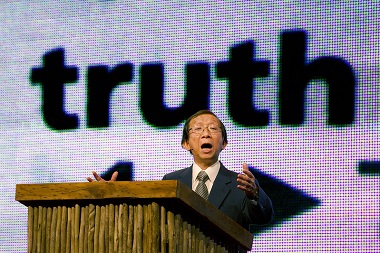
Carver Yu, Hong Kong, President and Professor in Dogmatics at the China Graduate School of Theology, explored Christian claims to truth in an Asian context. Lausanne Movement photo
The call to action uses the six Congress themes, which are linked to the six expositions of Ephesians.
A. Bearing witness to the truth of Christ in a pluralistic, globalized world.
The Congress affirmed belief in absolute truth, and particularly in Jesus Christ as the Truth. Christians, therefore, are called to be people of truth, to live and proclaim the truth. We must face the threat of postmodern relativistic pluralism with robust apologetics. We must promote truth in the workplace and the global media.
We must harness the arts for mission, promote authentically Christian responses to emerging technologies and actively engage the public arenas of government, business and academia with biblical truth.
B. Building the peace of Christ in our divided and broken world.
Christ has reconciled believers to God and to one another; the unity of God’s people is both a fact and a mandate. The Church, therefore, has a responsibility to live out its reconciliation and to engage in biblical peace-making in the name of Christ.
This includes bringing Christ’s truth and peace to bear on racism and ethnic diversity, slavery and human trafficking, poverty and minority groups such as people with disabilities. It also means our missional calling includes responsible stewardship of God’s creation and its resources.
C. Living the love of Christ among people of other faiths.
Our ‘neighbours’ include people of other faiths. We must learn to see them as neighbours and be neighbours to them. We seek to share the good news in ethical evangelism, and we reject unworthy proselytizing.
We accept that our commission includes a willingness to suffer and die for Christ in reaching out to people of other faiths. We are called to embody and commend the gospel of grace in loving action, in all cultures.
We need to respect ‘diversity in discipleship’, and encourage one another to exercise cultural discernment. We recognise global diaspora as strategic for evangelization: scattered peoples can be both recipients and agents of Christ’s mission.
While being willing to sacrifice our own rights for the sake of Christ, we commit to uphold and defend the human rights of others, including the right to religious freedom.
D. Discerning the will of Christ for world evangelization.
Six key areas are identified as strategically important for the next decade:
(a) unreached and unengaged people groups;
(b) oral cultures;
(c) Christ-centred leaders;
(d) cities;
(e) children; all with
(f) prayer.
The focus on Christian leaders is to prioritize discipleship and address the problems that arise from ‘generations of reductionist evangelism’. Within this, key priorities are Bible translation, the preparation of oral story Bibles and other oral methodologies, as well as eradicating biblical illiteracy in the Church.
Cities are home to four strategic groups: future leaders, migrant unreached peoples, culture shapers and the poorest of the poor. All children are at risk; children represent both a mission field and a mission force.
E. Calling the Church of Christ back to humility, integrity and simplicity.
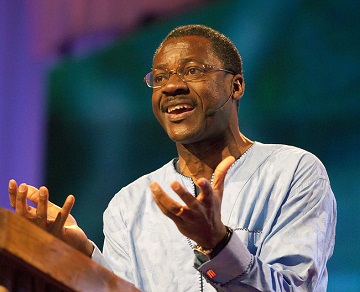
Kenyan pastor Calisto Odede challenged participants to consider whether Christianity makes any difference in their lives. Lausanne Movement photo
The integrity of our mission in the world depends on our own integrity. The Congress called Christ-followers back to humble, sacrificial discipleship, simple living and moral integrity. We need to be separate and distinct from the world (morally).
Four ‘idolatries’ were singled out: disordered sexuality, power, success and greed. Disciples of Christ must reject these. (The prosperity gospel is rejected under the banner of ‘greed.’)
F. Partnering in the body of Christ for unity in mission.
Paul teaches us that Christian unity is a creation of God, based on our reconciliation with God and with one another. We lament the divisiveness of our churches and organizations, because a divided Church has no message for a divided world. Our failure to live in reconciled unity is a major obstacle to authenticity and effectiveness in mission.
We commit to partnership in global mission. No one ethnic group, nation or continent can claim the exclusive privilege of being the ones to complete the Great Commission.
Two specific aspects of unity in mission are the partnership of women and men and the recognition of the missional nature of theological education.
Prepared by Kevin Smith from the South African Theological Seminary. This summary document is saturated with the actual language of the CTC, for which reason quotation marks are not used for every phrase lifted from the CTC. Only longer quotations and key phrases are marked by quotation marks. This document serves as a précis of the CTC.
To read the full Cape Town Commitment, go to www.lausanne.org/ctcommitment.
